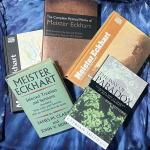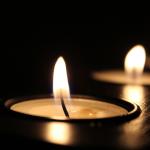
Bathing in the Stillness of Lent
Are we bathing in the stillness of Lent this year?
Lent is not a season about giving things up. It is not a liturgical second chance when we have not followed through on our New Year’s resolutions. Lent is not primarily about chocolate or caffeine, alcohol or social media.
We are finishing a season about being honest with ourselves, with other people, with spiritual life. During Lent, we take honest, insightful looks at who we really are. Lent is about reflecting on what we hold onto which holds us back from becoming our truest selves. We look ourselves in the eye and recognize what we do not truly need.
Lent is a time for us to pause long enough to take time to soak ourselves in the sacred stillness within us and around us.
It is a season for us to bathe in stillness for 40 days. Lent will soon be over, and stillness will be more challenging for us to find.
Within days, our week will be filled with special services and activities. The stillness of Lent will be a thing of the past. We will go back to living the way we did before we decided to make a special effort to listen.
It will be time for us to stand up, step out of the relaxing, reassuring bath, and dry ourselves off.
We come from the earth, and to the earth we will return. Our physical life will not last forever, and there are things beyond us.
There are things beyond our reach, even when our spirits may soar. What of this finite life will live on when our bodies are no longer here?
Can Lent Be a Contemplative Practice?
Many people assume Lent is about particular actions we take or stop taking.
Some of us decide to either break free from a habit or cultivate a new one during Lent. We may decide to stop smoking or eating red meat or drinking alcohol between Ash Wednesday and Easter.
It is easy for us to get caught up in our expectations about what we are doing. We forget why we are doing it. Some people intentionally choose to break a habit which will not be too challenging for them to break. We might focus so much attention on meeting our own expectations we miss the point of Lent.
I wake up early in the morning, before anyone else, and sit alone in the stillness and the darkness. Breathing deeply, I sit and listen to the stillness of the rain falling outdoors.
Lent is an excellent opportunity for bathing in sacred stillness. It is just barely spring here, and there is a richness and depth to the stillness of Lent.
Sitting still, I practice releasing my grasp on the day. For these few minutes there is nothing I need to prepare, nothing I need to complete, nothing I need to do. This time is for sitting still and listening to the stillness of Lent.
There is no need to analyze or understand, no need to justify or explain, nothing I need to regret. This is time for listening, for allowing sacred stillness to fill me.
Why Are We Bathing in the Stillness?
We are not listening to hear a particular answer or specific instructions. All we need to do is bathe in the sacred stillness.
Lent transforms us. We soak, and the stillness around us and within us fills us with its wisdom.
Our practices transform us into contemplatives by teaching us how to sit still. Sacred stillness draws us in and wins us over. We sit still and the sacred stillness, like the sound of falling rain, shows us the way.
When we soak in it, sacred stillness shares its story with us. As we bathe in the stillness of Lent we find ourselves in its story.
The story wraps itself around the people who came before us, and ourselves, and those who will come in the future. It carries us along and shows us its hope and its purpose. We listen to the story without words in the sacred stillness.
Why is it so easy for us to forget we are part of a story which is larger than we are?
We get confused and start to believe we are at the center of the story, or are writing it ourselves. The story in the stillness of Lent is much larger, much more significant than what we usually see. It is easy to become distracted, to get caught up by another shiny object.
When we take time to stop and bathe and listen, we remember the importance of the stillness.
We get caught up in what we think is important and we forget what is truly significant. It is our bathing in the stillness of Lent, early on a dark winter morning, which helps us remember.
Lent Draws Us Back to Ourselves
Many of us stopped practicing bathing in stillness years ago. The stillness of Lent guides us back to remember the story which sparks our imagination.
We sit still and bathe in the stillness of Lent. Lent tells us its sacred story in the stillness.
The weather outdoors cannot disturb us and the people sleeping all around us cannot distract us. The sacred stillness of Lent tells us its story, a little more each day, and we soak in it.
We are not trying to write it down, word for word, or sort through it to find its meaning. When we bathe, we bathe. We take deep breaths and listen to the rhythm of the stillness. Each day reveals its own part of the story.
The story is more than the sum of its parts. It takes us time to appreciate how all the parts, all the people in the story, fit together.
Bathing allows the story to flow over and through us. Each time we listen reminds us of the other parts of the story we heard long ago. Slowly we begin to recognize how they all fit together.
Each of us, in our contemplation, knits the story together for ourselves.
What needs to change in us so we can bathe in the stillness of Lent?
How Do We Start?
Bathing in the stillness of Lent begins with setting aside our own assumptions and expectations.
It is easy to get caught up in what we have heard, or think we remember we heard, about what Lent should be. Some people assume certain things are appropriate as Lent disciplines and others are not. It is as if there is a list of approved practices we are supposed to follow. There is not.
The ways we practice Lent are up to each of us as individuals. Our practice is personal. Each of us can take some time and discern what our practice will be.
One year I gave up fear for Lent. Another year I gave up Netflix. There was a job I gave up for Lent.
Each of us chooses how we will practice Lent each year for ourselves. There are no rules we need to follow, no standards we need to meet.
Some people choose a practice they want to begin rather than one they would like to end.
It can also be helpful to set a time each day to remind ourselves we are listening to the stillness of Lent this year. It can be easy for us to lose track.
Are We Bathing in the Stillness of Lent?
I feel supported when I am surrounded by other people who appreciate bathing in the stillness of Lent.
We are not compelled to share the details of our practices even while encouraging and praying for each other. It is enough for us to know we each intend to practice.
It can be helpful, for some people, to share honestly about our practices with another person. They need to be someone we trust to keep our confidences and trust to have our best interests at heart.
One of the most attractive and supportive aspects of practicing Lent as a contemplative is having a network. Even though I may not know all the details, I know I am part of a large network of contemplative practice.
Today, people around the world are bathing in the sacred stillness of Lent. There is never a time throughout the day when there is not someone bathing in the stillness of Lent.
Each of us is an encouragement and inspiration to other people who are bathing in the stillness of Lent this year.
How are we bathing in the stillness of Lent today?
What questions and insights will the stillness of Lent ignite within us this year?
[Image by Matt Cunningham Photography]
Greg Richardson is a spiritual director in Southern California. He is a recovering assistant district attorney and associate university professor and is a lay Oblate with New Camaldoli Hermitage near Big Sur, California. Greg’s website is http://StrategicMonk.com and his email address is StrategicMonk@gmail.com.














